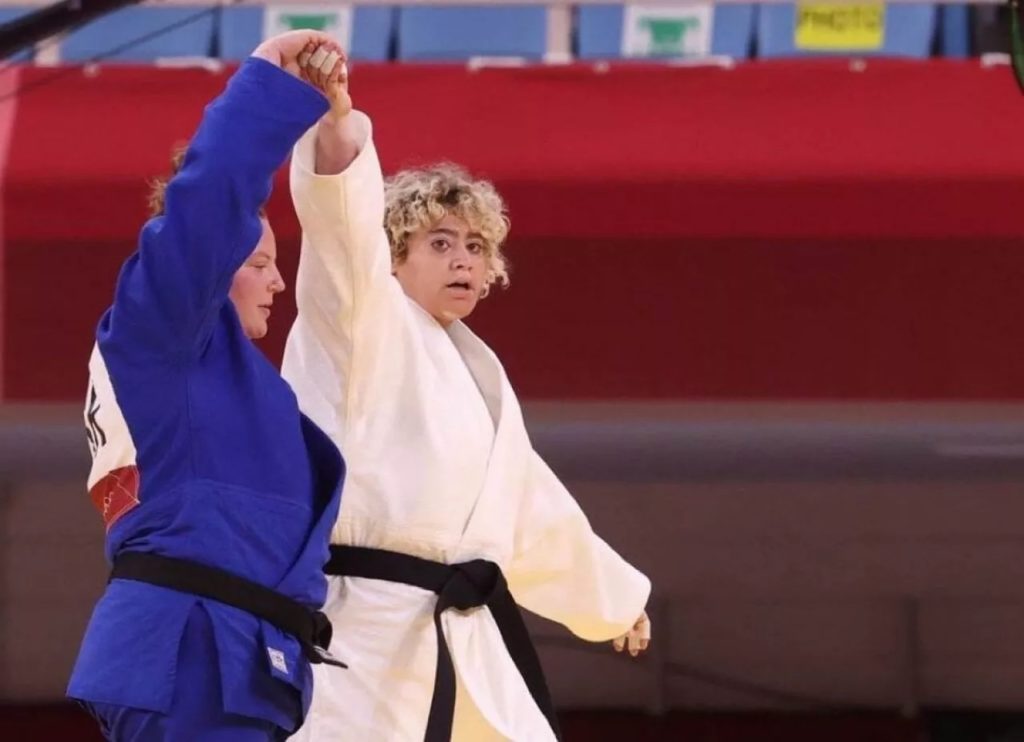Australia/Israel Review
Scribblings: Olympian Disdain
Aug 25, 2021 | Tzvi Fleischer

On July 30, two judokas squared up for an elimination match at Nippon Budokan arena as part of the women’s 78 kg. judo competition at the Tokyo Olympics. Athletically, it was not an important match – neither competitor was expected to medal and neither did. Yet the match made headlines around the world and even prompted a glowing media release from the International Judo Federation (IJF). Moreover, it was the loser who garnered most of the attention.
The reason for that attention was that the match pitted Saudi judoka Tahani Alqahtani against Israeli competitor Raz Hershko (who ended up winning). And there is a long tradition in both the Olympics and other international competitions of athletes from Arab and Muslim countries refusing to face off against Israeli opponents – either by throwing a prior round, or by simply forfeiting, sometimes by claiming injury.
Before the match, there had been a lot of speculation whether Alqahtani – the first Saudi woman to represent her country in judo at the Olympics – would or would not agree to face off against Hershko. She did, with the support of her country’s Olympic federation, and the two even shook hands afterward.
Following the match, the IJF media release praised Alqahtani and the Saudi Arabian Olympic Committee, saying, “Saudi Arabia proves that, through sport, we can go beyond differences and make sport a force to unite the world.”
On one level, this high praise seems absurd. Athletes go to the Olympics to compete against other athletes from all countries. Why should Alqahtani be applauded merely for doing what every Olympian is supposed to do?
Yet, on another level, actions like the IJF’s statement are actually important and valuable – they are part of a larger push over recent years to break down a long-standing boycott of Israeli sportspeople that is contrary to both the spirit of the Olympics and the letter of athletic competition rules.
After decades of inaction, there has been increasing pressure from international sporting bodies on their member countries to end sports discrimination against Israel. Countries have been threatened with bans on hosting sporting tournaments unless Israelis are allowed to compete equally. In one famous case, the International Paralympic Committee stripped Malaysia of the right to host the 2019 World Para Swimming Championships because Malaysia would not allow Israelis to compete.
Meanwhile, Iran, in particular, has come under heavy scrutiny and pressure for its more or less open practice of forcing its athletes to refuse to compete against Israelis at international tournaments. Judo has been at the epicentre of these controversies
In May 2019, the IJF had hailed a breakthrough with Iran after Iranian sporting officials ostensibly pledged that Iran’s athletic federations would fully “respect the Olympic Charter and its non-discrimination principle.”
But in September of that same year, Iran was caught blatantly violating that pledge. At the 2019 Judo World Championships in Tokyo, Iran’s Saeid Mollaei, the 2018 world champion, was called by Iranian Deputy Sports Minister Mohammad Reza Davarzani and ordered to withdraw from the semi-final rather than risk facing Israeli judoka Sagi Muki in the final. In what appeared to be a clear threat, Mollaei was then called by Iranian Olympic Committee President Reza Salehi Amiri who said security services were at his parents’ house.
As a result, the Iranian Judo Federation was given an indefinite ban from all competition by the IJF in 2019 – later converted to a four-year ban by the Court of Arbitration for Sport.
Mollaei, meanwhile, said he feared for his life and fled to Germany. He later obtained Mongolian citizenship, went to Israel to compete and became fast friends with erstwhile Israeli rival Muki. At the Tokyo Olympics, he won a silver medal and dedicated it to Israel, saying, “Thank you to Israel for the good energy… I hope the Israelis are happy with this win.”
However, neither this defection nor the IJF ban appears to have had any effect on the Iranian Government’s attitude.
In 2020, the Iranian parliament placed a clause in a proposed anti-Israel bill that would have formally banned all Iranian athletes from competition against Israelis. The clause was eventually removed from the bill after athletes protested that it would likely have led to their being banned from all international competition. However, Ebrahim Azizi, a member of the parliamentary committee that drafted the clause, insisted that even being banned from all international competition would have been “no problem” for Iran, as long as it upheld its supposed ideological principles.
Of course, even without a formal law, the informal Iranian ban on competing with Israelis remains in force.
Nor is Iran the sole problem. At Tokyo, there were at least two cases of apparent refusals to face Israeli opponents, both in judo – highlighting why Alqahtani’s decision to show up was notable.
Sudanese judoka Mohamed Abdalarasool simply didn’t turn up for his match against an Israeli opponent, while Algerian competitor Fethi Nourine announced his withdrawal immediately after the draw was announced pitting him against an Israeli in the second round. Nourine said, “We worked a lot to reach the Olympics… But the Palestinian cause is bigger than all of this.”
Nourine and his coach, who supported Nourine’s withdrawal, were both given bans from competition and sent home.
Nonetheless, the boycott of Israeli athletes continues to be encouraged by Palestinian Olympic Committee Chairman Jibril Rajoub, who posted photos of himself with Nourine on social media, and wrote that he appreciates Nourine’s “courageous stance refusing normalisation.”
So the drama over the Alqahtani-Hershko judo match was a symbol of progress, but also evidence of the continued prevalence of ugly discriminatory practices in sport which have been allowed to persist for far too long.
Tags: Iran, Israel, Middle East, Saudi Arabia






